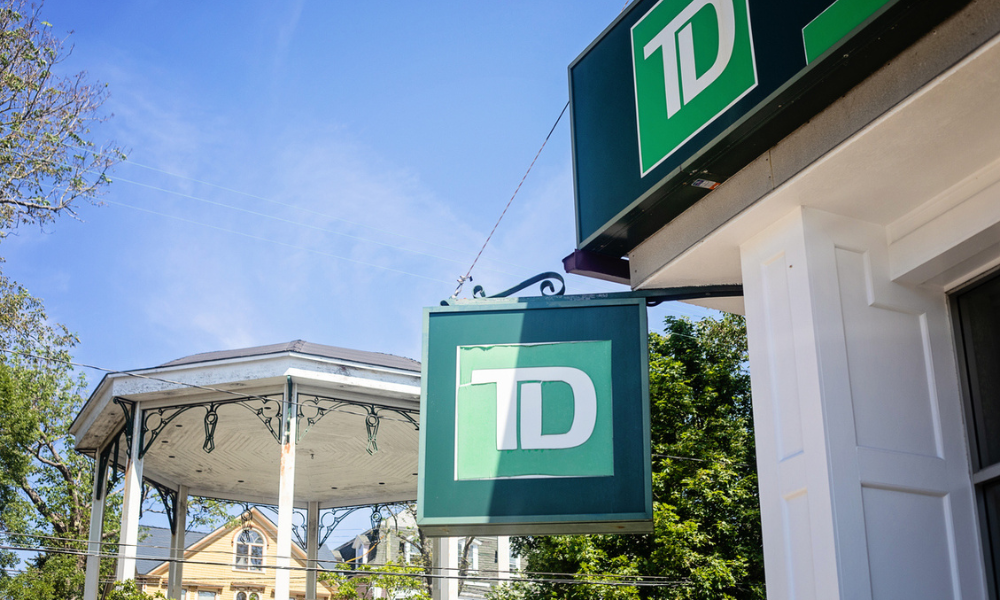TD Bank surpasses earnings forecasts with strong trading contributions, despite rising credit losses

Toronto-Dominion Bank surpassed analysts’ expectations due to strong performance in its capital-markets division, as reported by BNN Bloomberg.
The bank announced that a “comprehensive overhaul” of its US anti-money-laundering program is “well underway.”
In the fiscal second quarter, Canada’s second-largest lender earned $2.04 a share on an adjusted basis, exceeding the $1.85 average estimate of analysts in a Bloomberg survey.
The acquisition of US investment bank Cowen Inc., completed in last year’s second quarter, contributed to the capital-markets unit’s net income doubling to $441m on an adjusted basis.
“We had strong contributions from trading, investment banking — and that would include advisory underwriting as well — and then lending revenues too,” said Chief Financial Officer Kelvin Tran. “So, fairly broad-based. We’re very pleased with that.”
While the bank’s overall revenue grew from the previous year, provisions for credit losses totalled $1.07bn in the three months through April, exceeding analysts’ forecast of about $1bn.
North American consumers are increasingly struggling with credit-card payments, and Canadian homeowners face rising mortgage costs due to high interest rates. Business bankruptcies are also rising in Toronto-Dominion’s home market.
TD Bank is dealing with multiple US law enforcement and regulatory investigations into laundering funds tied to illegal drug sales. The bank has set aside US$450m for one of three regulatory probes and is investing heavily in improving its internal controls, increasing expenses.
On a conference call with analysts, Chief Executive Officer Bharat Masrani called the issue “unacceptable” and expressed hope for a resolution “as soon as possible,” but provided little additional commentary.
The money-laundering issues were not a problem at the “enterprise level,” said Ajai Bambawale, the bank’s chief risk officer.
“If I go right to the root cause of what happened, there were some procedural weaknesses in the US that caused bad actors to exploit us,” he explained. “And we were also disappointed that some of our colleagues didn’t follow our code of ethics.”
Analysts questioned whether the bank is constrained in expanding its retail footprint in the US, where it has about 1,200 branches.
Leo Salom, who leads the American division, said the bank is making significant investments to improve money-laundering controls and is “deliberately pacing” the addition of locations.
“I’m not making the claim that we cannot grow stores, but I also want to be clear that we are in the midst of discussion with regulators and I don’t want to prejudice any of those conversations at this point,” Salom said. “I know that there’s lots of questions about what we can and cannot do.”
The lender’s net income totalled $2.56bn, slightly below the $2.58bn average estimate, due to loan-loss provisions and higher expenses, including costs related to the anti-money-laundering probes.
The bank incurred a charge of $103m for a special assessment by the US Federal Deposit Insurance Corp. related to bank failures and $165m for severance payments and other cost-cutting measures.
The restructuring program, which is expected to lead to annual savings of $725m on a pretax basis, will conclude after a final $50m expenditure in the third quarter.
TD Bank has scrapped its proposed US$13.4bn acquisition of Memphis-based First Horizon Corp. last year due to regulatory approval issues linked to its anti-money-laundering controls.
The bank, with a surplus of capital, has been regularly buying back shares. Its Common Equity Tier 1 capital ratio to risk-weighted assets declined to 13.4 percent at the end of April, partly due to the regulatory provision booked in the quarter.
The bank’s results reflect broad-based strength across all operating segments, according to several analysts. However, focus remains on US anti-money-laundering issues.
“We continue to view TD’s US anti-money-laundering investigations as the biggest event impacting the company and consider this well-priced into its stock,” Royal Bank of Canada analyst Darko Mihelic noted.
The bank’s shares have fallen nearly 11 percent since the beginning of the year, with little change at $76.52 in Toronto.



